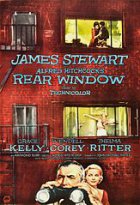
Rear Window Page #5
- PG
- Year:
- 1954
- 112 min
- 6,977 Views
EXT. NEIGHBORHOOD - DAY - SEMI-LONG SHOT
The salesman looks toward the bedroom door, hesitates, then
reluctantly walks toward it. For a moment he is hidden by
the wall.
INT. JEFF'S APARTMENT - DAY - CLOSEUP
Jeff shifts his look more to the right.
EXT. NEIGHBORHOOD - DAY - SEMI-LONG SHOT
The man enters the bedroom. We can see a woman lying on the
far bed. Near her, a small table is covered with medicine
bottles, spoons, boxes of pills, a water pitcher and the
other impedimenta of the chronically ill. The woman sits up
as the man enters. She takes a wet cloth off her forehead.
Before the man even reaches her, she begins talking, somewhat
vigorously. Pointing to a wristwatch, she seems to be saying
something such as "You should have been home two hours ago!
I could be lying here dying for all you'd know -- or care!"
The man stops short of the bed, makes gestures of trying to
placate her, but she goes on scolding. His attitude changes
to weary patience, then irritation, then anger.
He shouts back at her, turns and goes out of the room.
Back in the living room, he picks up his hat, throws it
against the wall in anger, and leaves the apartment, slamming
the door behind him.
INT. JEFF'S APARTMENT - DAY - MEDIUM SHOT
Jeff's attention is suddenly diverted to himself. His leg,
under the cast, begins itching. He squirms, tries to move
the leg a little. It gives no relief. He scratches the outside
of the cast, but the itch gets worse. He reaches for a long,
Chinese back scratcher lying on the windowsill. Carefully,
and with considerable ingenuity, he works it under the cast.
He scratches, and a look of sublime relief comes over his
face. Satisfied, he takes the scratcher out. As he replaces
it on the windowsill, his attention is drawn back to the
scene outside the window.
EXT. NEIGHBORHOOD - DAY - SEMI-LONG SHOT
We see the man who left his apartment in anger come out of
the doorway into the backyard. He is easy to identify through
the color of his garish necktie. In one hand the man carries
a small garden hoe and rake, and in the other a pair of
trimming shears. He goes to a small patch of flowers, perhaps
three feet square.
They are beautiful, multi-colored three foot high zinnias.
He kneels down, inspects them, touches them affectionately
and with some pride. His anger seems to have left him,
replaced by the kind of peace that flowers bring many people.
He stands up, carefully hoes the ground, them rakes it. Then
he snips a few leaves off the lower parts of the plant.
Finally, he waters them.
INT. JEFF'S APARTMENT - DAY - SEMI-CLOSEUP
Jeff's attention is turned to something else of interest.
EXT. NEIGHBORHOOD - DAY - SEMI-LONG SHOT
Into the next door yard we see emerging from the apartment
below the ballet dancer, the elderly lady.
She wear a broad sun hat, dark glasses, and a sunsuit
consisting of pink shorts and halter. She carries a copy of
the Herald Tribune, and still wears her hearing aid. She
settles into a folding, canvas deck chair.
Her skin is dead white, and her body is thin to the point of
emaciation. No sooner has she settled into her chair, than
she is attracted by the sound of the salesman working in his
garden. She gets up, walks to the fence, and looks over. He
notices her, but doesn't speak.
She begins gesturing to him how to take care of his flowers.
He listens for a moment, then looks directly at her. The
strong movements of his mouth show us that he objects
vigorously to the annoyance of her comments. She moves away
from the fence, started and a little shocked.
INT. JEFF'S APARTMENT - DAY - MEDIUM SHOT
Jeff is seated in the foreground, in a waist shot.
Behind him, the entrance door to his apartment opens.
STELLA McGAFFERY comes in. She is a husky, unhandsome, dark-
haired woman who is dressed like a district nurse, with dark
coat, dark felt hat, with a white uniform showing underneath
the coat. She carries a small black bag.
Stella pauses on the landing to watch Jeff. He doesn't appear
to notice her entrance.
STELLA:
(Loud)
The New York State sentence for a
peeping Tom is six months in the
workhouse!
He doesn't turn.
JEFF:
Hello Stella.
As she comes down the stairs of the landing, holding on the
wrought iron railing with one hand:
STELLA:
And there aren't any windows in the
workhouse.
She puts her bag down on a table. It is worn, and looks as
if it belongs more to a fighter than a nurse. She takes off
her hat coat, and hangs them on a chair.
STELLA:
Years ago, they used to put out your
eyes with a hot poker. Is one of
those bikini bombshells you always
watch worth a hot poker?
He doesn't answer. She opens the bag, takes out some medical
supplies:
a thermometer, a stop watch, a bottle of rubbingoil, a can of powder, a towel. She talks as she works.
STELLA:
We've grown to be a race of peeping
Toms. What people should do is stand
outside their own houses and look in
once in a while.
(She looks up at him)
What do you think of that for homespun
philosophy?
Translation
Translate and read this script in other languages:
Select another language:
- - Select -
- 简体中文 (Chinese - Simplified)
- 繁體中文 (Chinese - Traditional)
- Español (Spanish)
- Esperanto (Esperanto)
- 日本語 (Japanese)
- Português (Portuguese)
- Deutsch (German)
- العربية (Arabic)
- Français (French)
- Русский (Russian)
- ಕನ್ನಡ (Kannada)
- 한국어 (Korean)
- עברית (Hebrew)
- Gaeilge (Irish)
- Українська (Ukrainian)
- اردو (Urdu)
- Magyar (Hungarian)
- मानक हिन्दी (Hindi)
- Indonesia (Indonesian)
- Italiano (Italian)
- தமிழ் (Tamil)
- Türkçe (Turkish)
- తెలుగు (Telugu)
- ภาษาไทย (Thai)
- Tiếng Việt (Vietnamese)
- Čeština (Czech)
- Polski (Polish)
- Bahasa Indonesia (Indonesian)
- Românește (Romanian)
- Nederlands (Dutch)
- Ελληνικά (Greek)
- Latinum (Latin)
- Svenska (Swedish)
- Dansk (Danish)
- Suomi (Finnish)
- فارسی (Persian)
- ייִדיש (Yiddish)
- հայերեն (Armenian)
- Norsk (Norwegian)
- English (English)
Citation
Use the citation below to add this screenplay to your bibliography:
Style:MLAChicagoAPA
"Rear Window" Scripts.com. STANDS4 LLC, 2025. Web. 22 Jan. 2025. <https://www.scripts.com/script/rear_window_431>.






Discuss this script with the community:
Report Comment
We're doing our best to make sure our content is useful, accurate and safe.
If by any chance you spot an inappropriate comment while navigating through our website please use this form to let us know, and we'll take care of it shortly.
Attachment
You need to be logged in to favorite.
Log In